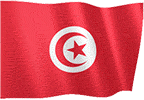
Republic of Tunisia
 Republic of Tunisia |
|
Quality Standards The National Standards and Industrial Property Institute (INNORPI) (1) (INNORPI) was set up in 1982 under the supervision of the Ministry of Industry with the task of centralizing and coordinating all activities, studies and surveys concerning standardization, certification and industrial property; applying the overall guidelines for the national standardization system and managing it in coordination with the parties concerned; and issuing conformity certificates. Tunisian Standards (2) Tunisia is currently applying ISO 9001 standards. The National Institute for Standardization and Industrial Property (INNORPI) is responsible for establishing national standards and has instituted ISO 14000 certification procedures. In addition, INNORPI is the national organization responsible for preparing and publishing Tunisian standards (NT).(3) In order to be able to use the NT mark, an application must be made to INNORPI, which proceeds to review the technical file and appoints a verification team. The latter conducts a preliminary on-site examination and takes samples for testing in the laboratory chosen by INNORPI, which prepares preliminary product certification verification. Depending on the results of the tests and the preliminary verification, an assessment report is forwarded to the technical committee. INNORPI's Director-General decides whether or not to grant the applicant the right to use the mark, taking into account the opinion of the technical committee. If the final decision is positive, it is published on INNORPI's website. The right to use the mark is granted for a renewable term of one year, during which there is a monitoring program in the form of periodic inspections. According to INNORPI, 96% of Tunisian standards were equivalent to international (for example, ISO, IEC, EN) or French standards in 2015. It is deemed important for international standards to be adopted in order to boost the competitiveness of exports and observe quality requirements. As of June 30, 2015, INNORPI's normative heritage includes 17053 Tunisian standards covering all sectors of the national economy. All these standards contribute to the structuring of the Tunisian economy and the development of its activities in symbiosis with the international standardization systems. They ensure, among other things, the preservation of the health and the safety of the consumer.(4) Testing, Inspection, and Certification (5) The Tunisian Accreditation Council (TUNAC) is the national accreditation agency. TUNAC evaluates and accredits conformity assessment bodies (i.e., laboratories and inspection and certification bodies) in accordance with relevant national and international standards. TUNAC has mutual recognition agreements with the International Laboratory Accreditation Cooperation (ILAC) and the European Cooperation for Accreditation (EA) for the accreditation of laboratories for analysis, testing, and calibration. TUNAC is also a signatory of the mutual recognition agreements with the International Accreditation Forum and the EA for the accreditation of certification bodies for quality and environmental management systems. Publication of Technical Regulations (6) INNORPI (http://www.innorpi.tn/en) is responsible for publishing and coordinating the creation of norms and standards and information relating to these, as well as developing general technical regulation programs. Technical Import Control (7) Around 11% of all tariff lines (all products such as carpets, clothing, beverages, milling products and some food preparations) are subject to technical import control. The Ministry of Trade specifies the list of products subject to technical import control. They are classified in three lists subject to three types of control depending on the nature of the product:
Controls are generally conducted at the site of customs clearance before Customs authorizes the release of the goods. Sanitary and Phytosanitary measures (8) For animals: special certificates are required for importing animals: for example, a certificate of purity/health and origin for live animals, meat, raw hides, vegetables, food additives, animal feed, beverages and other food products; and a certificate of origin and safety for bees and honey. A certificate of non-contamination by radioactivity is also required for imports of food products and animal feed. Animal products are subject to a three-stage veterinary sanitary control process: first, the documents are checked and then verified to ensure that their content corresponds to the products imported; and, finally, there is a physical inspection to check the storage conditions, weight and packaging. It may be decided to conduct laboratory analyses For plants, parts of plants and plant products: the phytosanitary certificate issued by the plant protection service in the exporting country must be in conformity with the IPPC (International Plant Protection Convention) model and must be in Arabic, French or English. Since 2013, the certificate has also had to include an additional country of origin declaration for some plants. Processed agriculture products: a phytosanitary certificate or inspection is not required for agricultural products that have been processed, for example, oils, vegetable, fats, brine, preserved foods, starch and flour, agricultural products intended for processing such as coffee, cocoa and hops, spices, condiments and incense. Live animals: The importation of live animals carrying any of the contagious diseases listed by decree is prohibited. When live animals are imported, the sanitary status of the exporting country is taken into account or, failing that, the status of the region, then the farm and, finally, the animal, in accordance with OIE resolutions. Production livestock may only be imported from countries/regions free of the diseases. (1) INNORPI official portal(2) WTO – Trade Policy Review – Tunisia 2016(3) International Trade Administration, Country Commercial Guide, Tunisia , updated Oct. 2019.(4) INNORPI official portal(5) International Trade Administration, Country Commercial Guide, Tunisia , updated Oct. 2019.(6) International Trade Administration, Country Commercial Guide, Tunisia , updated Oct. 2019.(7) WTO – Trade Policy Review – Tunisia 2016(8) WTO – Trade Policy Review – Tunisia 2016 |